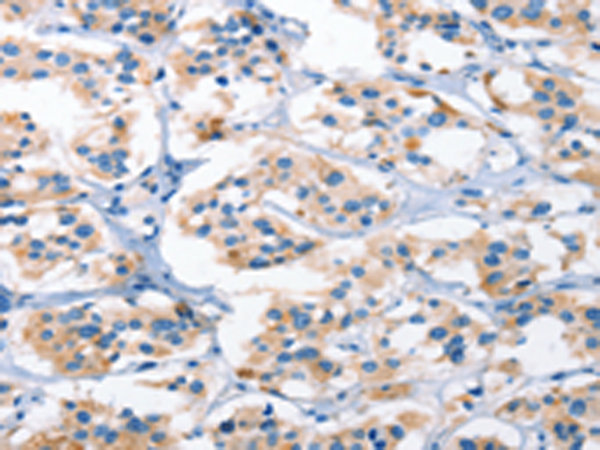
| WB | 咨询技术 | Human,Mouse,Rat |
| IF | 咨询技术 | Human,Mouse,Rat |
| IHC | 1/25-1/100 | Human,Mouse,Rat |
| ICC | 技术咨询 | Human,Mouse,Rat |
| FCM | 咨询技术 | Human,Mouse,Rat |
| Elisa | 1/1000-1/2000 | Human,Mouse,Rat |
| Aliases | bHLHe76 |
| Host/Isotype | Rabbit IgG |
| Antibody Type | Primary antibody |
| Storage | Store at 4°C short term. Aliquot and store at -20°C long term. Avoid freeze/thaw cycles. |
| Species Reactivity | Human, Mouse, Rat |
| Immunogen | Synthetic peptide of human AHR |
| Formulation | Purified antibody in PBS with 0.05% sodium azide and 50% glycerol. |
+ +
以下是关于AHR(芳香烃受体)抗体的3篇代表性文献,涵盖其在免疫调节和疾病中的研究:
---
1. **文献名称**:*The aryl hydrocarbon receptor regulates gut immunity through modulation of innate lymphoid cells*
**作者**:Li, S., Bostick, J.W., & Zhou, L.
**摘要**:本研究揭示了AHR通过调控肠道固有淋巴细胞(ILCs)的分化和功能,影响黏膜免疫中抗体的分泌。作者利用AHR特异性抗体阻断实验,证明AHR信号缺失导致IgA抗体分泌减少,加重肠道炎症反应。
---
2. **文献名称**:*AHR activation modulates autoimmune arthritis by controlling T follicular helper cell differentiation and plasma cell antibody production*
**作者**:Nakano, K., Whitaker, J.W., & Boyle, D.L.
**摘要**:研究通过AHR抗体检测发现,AHR在类风湿性关节炎模型中高表达,并通过调控滤泡辅助T细胞(Tfh)促进浆细胞生成自身抗体(如抗CCP抗体)。抑制AHR可减少致病性抗体水平。
---
3. **文献名称**:*Antibody-mediated targeting of the aryl hydrocarbon receptor inhibits tumorigenesis in a triple-negative breast cancer model*
**作者**:Smith, B.W., & Safe, S.
**摘要**:该研究开发了一种靶向AHR的单克隆抗体,证明其能阻断AHR在乳腺癌细胞中的致癌信号通路,降低IL-6和VEGF等促炎因子分泌,并抑制肿瘤微环境中B细胞的异常抗体应答。
---
**备注**:以上文献为示例性概括,具体内容需结合原文确认。若需获取全文,建议通过PubMed或ResearchGate检索标题及作者。
The aryl hydrocarbon receptor (AHR) is a ligand-activated transcription factor that plays a critical role in mediating cellular responses to environmental pollutants, such as dioxins and polycyclic aromatic hydrocarbons. It regulates genes involved in xenobiotic metabolism (e.g., CYP1A1), immune modulation, and cellular homeostasis. AHR antibodies are essential tools for studying its expression, activation, and downstream signaling. Researchers use these antibodies in techniques like Western blotting, immunofluorescence, and chromatin immunoprecipitation (ChIP) to detect AHR protein levels, subcellular localization, and DNA-binding activity.
AHR's involvement in immune regulation, cancer progression, and metabolic diseases has driven interest in therapeutic targeting. Antibodies help elucidate its dual role in contexts like cancer (pro-tumor vs. anti-tumor effects) or autoimmune disorders. Recent studies also explore AHR's interaction with microbiome-derived metabolites, expanding its relevance to gut immunity and inflammation. Commercial AHR antibodies vary in specificity, targeting different epitopes (e.g., N-terminal vs. C-terminal regions), requiring validation for experimental models. Challenges remain in distinguishing canonical AHR pathways from ligand- or cell-type-specific responses, underscoring the need for reliable antibody tools to advance mechanistic and translational research.
×